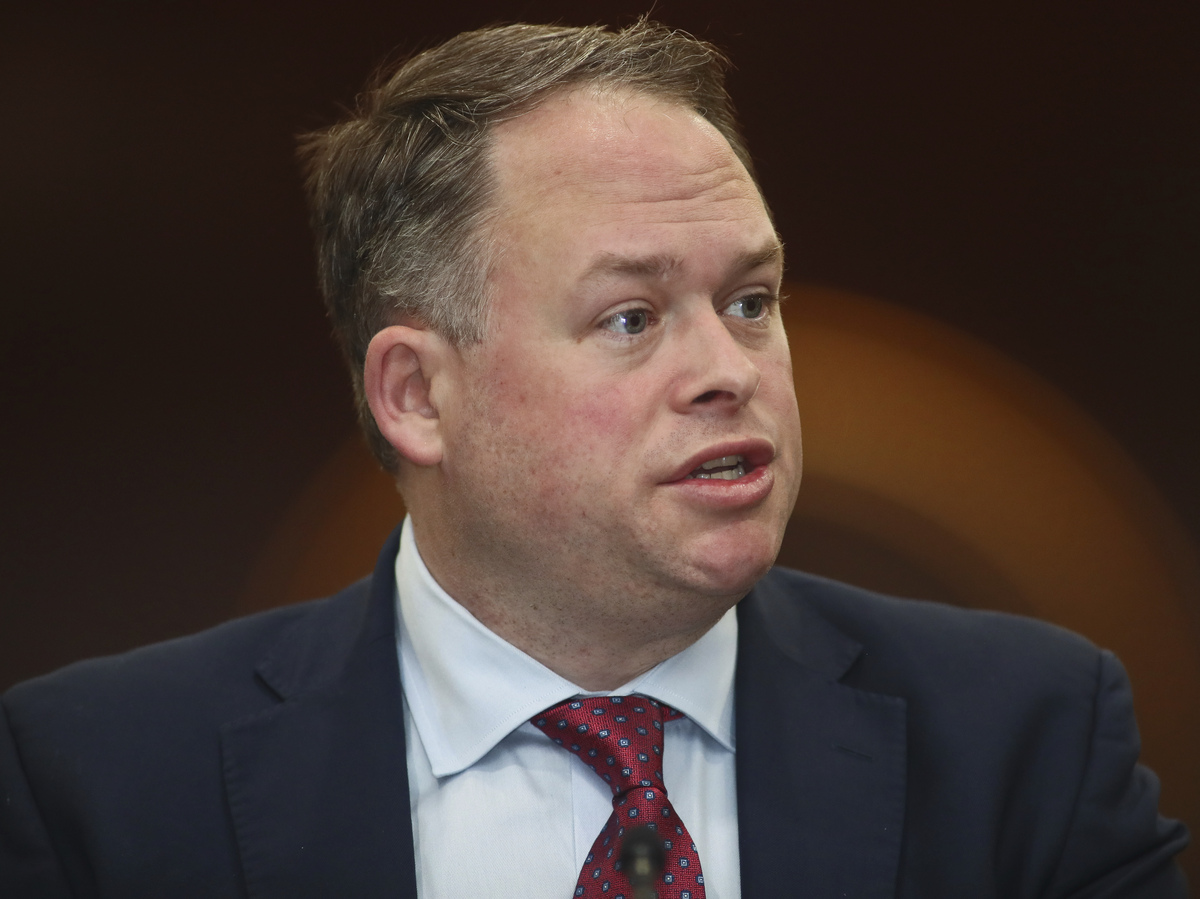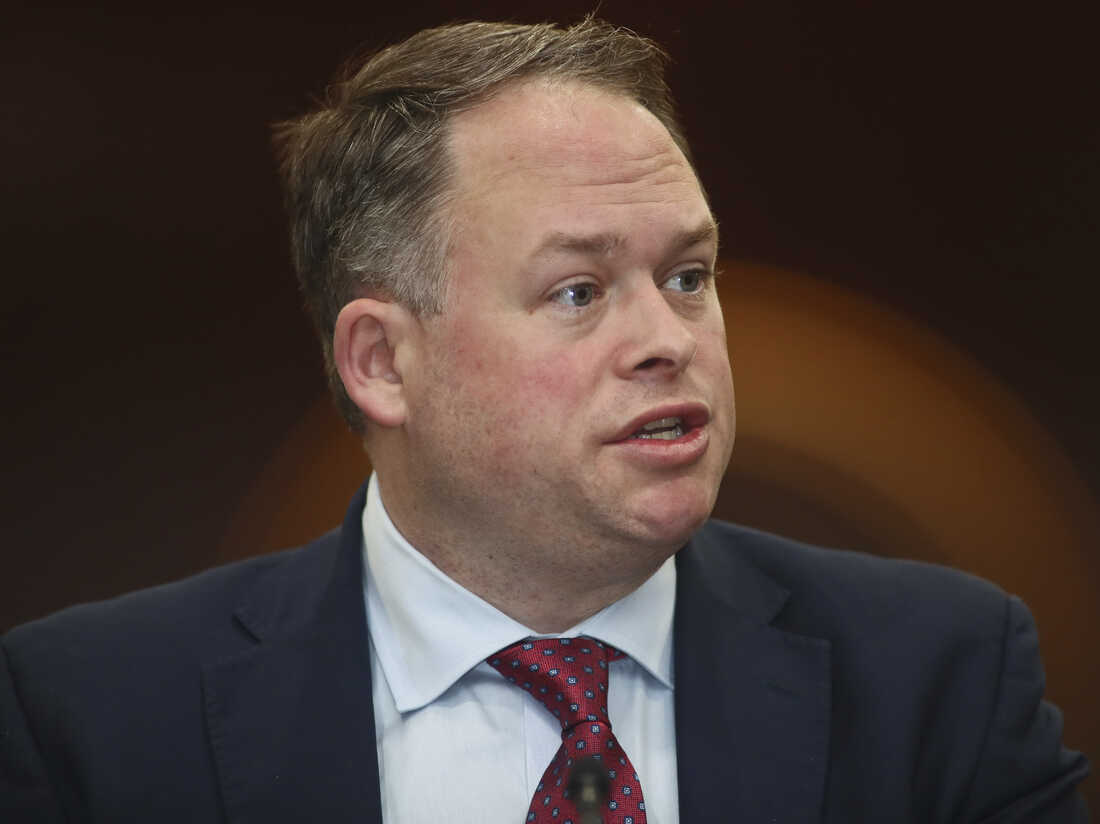Jason Weida is the secretary for Florida’s Agency for Health Care Administration, which has been named in a lawsuit.
Phil Sears/AP
hide caption
toggle caption
Phil Sears/AP

Jason Weida is the secretary for Florida’s Agency for Health Care Administration, which has been named in a lawsuit.
Phil Sears/AP
A toddler with cystic fibrosis living in Jacksonville, Fla. missed weeks of her medication after she and her mother were cut off from Medicaid.
And in Miami-Dade county, a one-year-old missed a routine vaccination – her mother got a call the day before the appointment informing her the check-up was canceled because the child no longer had insurance.
These two children and their parents are suing the state of Florida alleging that their Medicaid coverage was terminated without proper notice or a chance to contest the state agency’s decision.
The lawsuit was filed Tuesday in the U.S. District Court in Jacksonville by the Florida Health Justice Project and the National Health Law Program, and the complaint was shared exclusively with NPR.
Attorneys for the plaintiffs believe it to be the first lawsuit of its kind since Medicaid “unwinding” began in April. The complaint says the plaintiffs’ due process rights were violated and are asking the court to instruct the state Medicaid agency to stop disenrolling Floridians “until timely and legally adequate notice of termination has been provided to them.”
Millions out of Medicaid, most for paperwork reasons
For three years during the COVID-19 pandemic, no one had to go through any kind of renewal process to stay on Medicaid. Now that protection has come to an end, and every state is assessing eligibility for everyone on its rolls.
So far, more than 5.2 million people have lost Medicaid nationally, according to reports from 45 states and the District of Columbia analyzed by health research firm KFF. And 74% of people, on average, are losing coverage for paperwork reasons, not because they actually no longer qualify for coverage, according to KFF.
More than 400,000 Floridians have lost coverage so far, although KFF’s Jennifer Tolbert points out, this is in part a reflection of the size of the program in this country’s third most populous state. “Interestingly, though, Florida’s disenrollment rate is 31%, which is below the overall average of 38%,” Tolbert says.
She adds that many Medicaid recipients in the state are children and low-income parents because Florida did not expand Medicaid, one of the few remaining states to hold out on doing so.
The Florida Department of Children and Families sent NPR a flier touting how the state is “continuing to lead on redeterminations.” It said 1.9 million beneficiaries had been redetermined to date, and 89% responded to the form sent out by the agency.
The agency did not have an immediate reaction to the lawsuit when contacted at press time.
The Florida lawsuit describes how the two families suing the state received extremely confusing notices from Florida’s Medicaid agency. The notice was many pages long, included conflicting information from one section to another, and did not clearly explain why coverage was ending or what steps the families could take to contest the decision.
In the case of the family in Jacksonville, 25-year-old Chianne Douberley had just had a baby in February, and should have been covered for 12 months postpartum until February 2024. Her two-year-old daughter Charlotte, who has cystic fibrosis, qualified for coverage because she is “medically needy.” The Douberleys recently shared their story in the Orlando Sentinel.
Vulnerable kids on Medicaid
Nearly 14 million children across the country had special health needs in 2019, according to a KFF analysis. “This is a category of eligibility where the state allows families to count medical expenses against their income – so even though their income may be too high to qualify for Medicaid, on a monthly basis because of ongoing health care needs, the individual does qualify,” explains Tolbert. In Florida, there were nearly 800,000 children with special health needs in 2019, and more than half of them were on Medicaid.
The complaint describes how Chianne contacted the state agency to ask for clarity after receiving the Medicaid notice, and was told by an agent “I’m not going to sit here and answer your questions” and “I have a rule that says I cannot talk to you for over 20 minutes.” Chianne and her toddler’s Medicaid coverage ended on May 31.
Charlotte “missed multiple weeks of her prescription drugs and as a result, lost her appetite and was constantly tired and moody,” the lawsuit alleges.
It says she also developed a persistent cough, and her parents took her to a hospital emergency department for treatment because her primary care doctor would not see her without insurance. The $2,800 bill for that hospital visit has been sent to collections, according to the complaint.
Denial of responsibility! My Droll is an automatic aggregator of Global media. In each content, the hyperlink to the primary source is specified. All trademarks belong to their rightful owners, and all materials to their authors. For any complaint, please reach us at – [email protected]. We will take necessary action within 24 hours.


